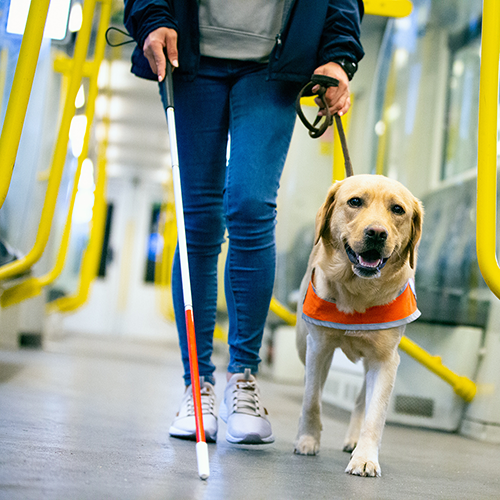Accessibility FAQs
Read frequently asked questions about accessibility.


Frequently Asked Questions
What is the difference between "accessibility" and "digital accessibility"?
Digital Accessibility typically refers specifically to Web Content Accessibility Guidelines, also called WCAG (pronounced “wick-Ahg”) for short. WCAG is a list of guidelines that explain how to make web content accessible to people with disabilities.
Accessibility is a broader umbrella term for many types of access, including physical access to buildings.
How people refer to these two can vary between communities.
How do I give feedback?
To give feedback on the state policy, Wa-Tech, a state agency that manages the standards of state agency websites, is in the process of updating Policy 188.
If you are interested in submitting public comment or feedback about what should be in the Policy, please email access@equity.wa.gov with the subject line “Policy 188” to get info about the next opportunity for input.
If you want to give input to our Accessibility Plan, please email access@equity.wa.gov with the subject line “Access Plan.” As technology is always changing and community needs can shift over time, we too believe that our approach must evolve over time and for that reason your feedback is needed – what to keep the same, what to take out, and what to add.
If you want to let us know how you’re finding our website and alert us to any areas of potential improvement, please know we take this feedback seriously and have altered our future documents, forms, newsletters, events, thanks to feedback from state employees and the public.
What is Policy 188?
Washington state’s OCIO Policy 188 establishes the expectation for state agencies that people with disabilities have access to and use of information and data and be provided access to the same services and content that is available to persons without disabilities, unless providing direct access is not possible due to technical or legal limitations.
Ongoing Training
We recognize that people have a variety of exposure to digital accessibility and accessibility in general. We take seriously finding what tools, training, and resources are needed to further accessibility. We also recognize that many teams and agencies have smaller offices, or may be new teams entirely, such as ourselves. As we build the road, we seek to create pathways so we are intentional about what we do with our limited capacity AND prioritize to meet the needs of people with disabilities.
Accessible Technology
In today's world, we use a variety of technologies to communicate with each other. Some call these technologies "Information and Communication Technologies." As an office seeking cutting-edge solutions to address the need for equity in state government, we will develop a process to examine potential technologies for their digital accessibility, to ensure an accessible experience for our community.
"Why can't you just use [software]?" / Potential Limitations
Software
- Many of the existing softwares or technology that are used by the Washington State Government were obtained before Digital Accessibility was part of the requirements. Therefore we will make every effort to create an accessible piece of content, but there may be limitations due to the vendor that controls that product. In that case, we will check with you and see what the solution, such as an alternate document, could be.
- Some licenses are statewide products and decided on by the Department of Enterprise Services. Learn about the process here. Give feedback to Department of Enterprise Services here: accessibility@des.wa.gov.
- Some government contracts are time-bound and subject to what is called a "competitive bidding process." See opportunities for bidding here.
- Do you have a suggestion for a technology that works well for you? Let us know at Access@equity.wa.gov.
Licensing and Procurement
Generally, state agencies looking to buy or license (use) softwares undergo a process called "procurement." To protect the information of the public, the softwares in question undergo an in-depth security review. The result of this is that agencies can be limited in which softwares we can obtain and how long it can take to get a license to use the product.
Why are security reviews necessary?
Cybersecurity is important to protect personally identifiable information. In today's day and age, we hear often about data breaches with various institutions such as hospitals and companies. When a state agency uses a software and asks the public to use this software, the software vendor's privacy policies therefore impact the public's information. There are significant concerns regarding the racial equity impacts and environmental impacts of Artificial Intelligence, amongst other concerns. There are also concerns about large tech companies collecting too much user data and not being transparent about what they're doing with it.
Considering the Needs and Limitations
We acknowledge that sometimes a software or product is the only one of its kind that can serve a function we want to provide for our audience, and make mitigation plans and adjustments wherever we can. As part of our overall procurement strategy, we test new softwares for accessibility and security to protect personal information. If you have a suggestion on any software that you think does this well, please send to access@equity.wa.gov!
Thank you!
We are building many things from the ground up, or may be the first of their kind, so we appreciate your input in building our vision. We produce a lot of innovative content with a small Communications Team! We thank you for engaging and working with us as we create an accessible and equitable future for Washingtonians, together.
